1796
The Senate approved the Treaty of San Lorenzo (or Pinckney's Treaty), acquiring the land forming the future state of Alabama.
1817
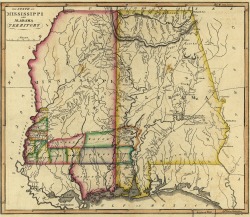
The Mississippi Territory was divided into the state of Mississippi and the Territory of Alabama.
1819
Alabama became the 22nd state in the Union.
1819

Following the admission of Alabama as a state into the Union, John W. Walker of Huntsville, the state's first U.S. senator, took the oath of office and was seated.
1819

William R. King of Cahaba, Alabama's second U.S. senator, took his oath of office and was seated. Senators King and Walker then drew lots to determine their class assignments. King drew Class 2 with a term to expire March 3, 1823. Walker drew Class 3, with a term to expire March 3, 1825.
1832
William R. King became chairman of the Senate Committee on Commerce, a position he held from 1832 to 1833, and again from 1836 to 1841.
1836
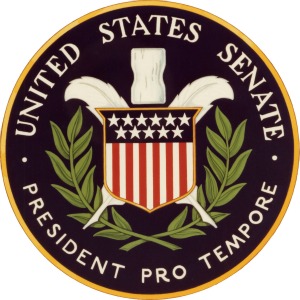
The Senate elected William R. King as president pro tempore. King served 10 separate terms as president pro tempore between 1836 and 1841.
1841
Senator Henry Clay of Kentucky apologized to Alabama senator William R. King. Following a dispute over Senate printers, King challenged Clay to a duel. When the two men began to prepare for an actual duel, the Senate's sergeant at arms arrested both men. A formal apology from Clay ended the dispute without bloodshed.
1846

Arthur P. Bagby of Tuscaloosa, elected to the Senate in 1841, became chairman of the Senate Committee on Indian Affairs, a position he held from 1846 to 1847.
1846

Dixon H. Lewis of Lowndesboro, who entered the Senate in 1844, became chairman of the Senate Committee on Finance, a position he held from 1846 to 1848.
1849
William R. King became chairman of the Senate Committee on Foreign Relations, a position he held from 1849 to 1851.
1852
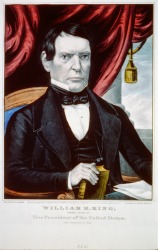
Senator William R. King was elected vice president of the United States on the Democratic ticket with Franklin Pierce. King was the first senator to gain a major party's nomination for the vice presidency. By special act of Congress, King was permitted to take the oath of office in Havana, Cuba, on March 4, 1853, where he was recovering from health problems. Returning to his home in Alabama, King died a month later, on April 18, 1853.
1857

The Senate elected Benjamin Fitzpatrick of Wetumpka, who began his Senate service in 1848, as president pro tempore. Fitzpatrick served nine separate terms as president pro tempore between 1857 and 1860.
1857

Clement C. Clay Jr. of Huntsville, who began his Senate service in 1853, became chairman of the Senate Committee on Commerce (today's Committee on Commerce, Science, and Transportation), a position he held from 1857 to 1861.
1861

Alabama seceded from the Union. Ten days later, Senators Clement Clay and Benjamin Fitzpatrick withdrew from the Senate. The Senate declared the seats vacant on March 14, 1861.
1868

Alabama was allowed to resume representation in the U.S. Congress. On July 21, George E. Spencer of Decatur was elected, and on July 23, Willard Warner of Montgomery, was elected, becoming Alabama's first post-Civil War U.S. senators.
1872

The Senate voted to seat George T. Goldthwaite of Montgomery following a contested election.
1877
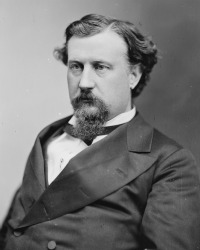
George E. Spencer became chairman of the Senate Committee on Military Affairs (today's Committee on Armed Services), a position he held from 1877 to 1879.
1879

John T. Morgan became chairman of the Senate Committee on Rules (today's Committee on Rules and Administration), a position he held from 1879 to 1881.
1893

James L. Pugh of Eufaula, who began his Senate service in 1880, became chairman of the Senate Committee on the Judiciary, a position he held from 1893 to 1895.
1893
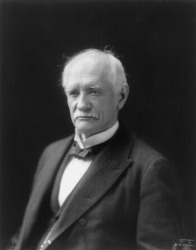
John T. Morgan became chairman of the Senate Committee on Foreign Relations, a position he held from 1893 to 1895.
1896
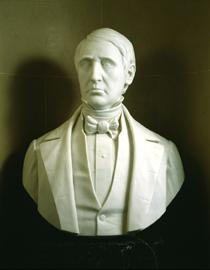
The U.S. Senate acquired a bust of former vice president William R. King for the Vice Presidential Bust Collection. The marble bust was carved by William C. McCaulsen.
1908
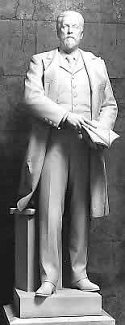
Congress accepted a marble statue of Jabez Lamar Monroe Curry, one of Alabama's two contributions to the National Statuary Hall Collection. The 7'4" statue was designed by artist Dante Sodini. (It was replaced by one of Helen Keller in 2009.)
1910
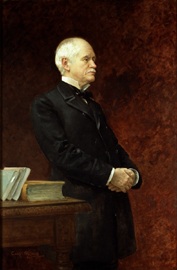
The Senate acquired a portrait of former Alabama senator John T. Morgan from Morgan's daughter, Cornelia.
1913

Joseph F. Johnston of Birmingham, who began his Senate service in 1907, became chairman of the Senate Committee on Military Affairs (today's Committee on Armed Services).
1914
The Senate voted to deny a seat to Franklin P. Glass who had been appointed by Alabama governor Emmett O'Neal.
1914

Frank S. White of Birmingham became Alabama's first directly elected senator after ratification of the Seventeenth Amendment in 1913. He ran in a special election to fill the vacancy in the term ending March 3, 1915, caused by the death of Senator Joseph Johnston.
1920

Oscar W. Underwood of Birmingham, who began his Senate service in 1915, was elected chairman of the Democratic Conference. Beginning in 1920, the Democratic Conference chairperson also served as Democratic floor leader. On April 27, 1920, Underwood became the first officially designated Democratic floor leader, a position he held until 1925.
1925
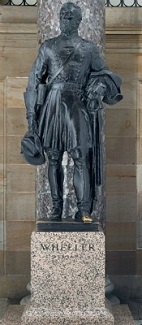
Congress unveiled a statue of Joseph Wheeler, the second of Alabama's two contributions to the National Statuary Hall Collection. The seven-foot bronze statue was designed by Berthold Nebel.
1927

Hugo L. Black of Birmingham, who began his Senate service in 1927, was elected secretary of the Democratic Conference, a position he held for 10 years.
1931

John H. Bankhead II of Jasper took the oath of office as U.S. senator, becoming the third of four members of the Bankhead family to serve Alabama in the U.S. Congress. His father, John H. Bankhead, served in the Senate from 1907 to 1920. His brother, William B. Bankhead, had been serving in the House of Representatives since 1917.
1932

J. Thomas "Cotton Tom" Heflin of Lafayette delivered his last blast in the Senate Chamber following his defeat as an independent candidate for the Senate in 1930. Heflin contested the election results and when the issue was debated by the full Senate, was allowed the unusual honor of speaking on his own behalf, even though he had been out of office for more than a month.
1933
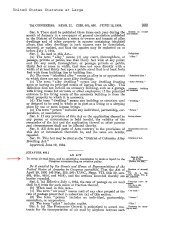
The Senate approved Alabama senator Hugo Black's resolution 349, to establish a special investigatory committee to inquire into the government's system of awarding of air and ocean mail contracts. Black was appointed chairman. The investigation lasted three years and led to passage of the Air Mail Act of 1934.
1937
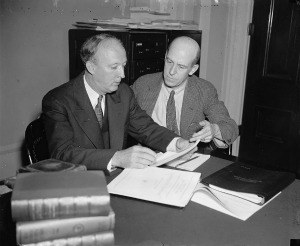
Hugo L. Black became chairman of the Senate Committee on Education and Labor (today's Committee on Health, Education, Labor, and Pensions).
1937

Dixie Bibb Graves of Montgomery became the first woman to represent Alabama in the U.S. Senate. Appointed by her husband, Governor Bibb Graves, to fill a vacant seat, Graves served until January 10, 1938.
1941
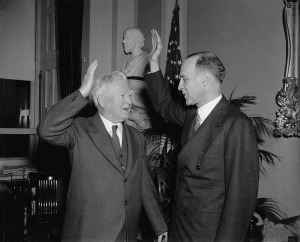
J. Lister Hill of Montgomery, who began his Senate service in 1938, was elected Democratic Party whip, a position he held for six years.
1952
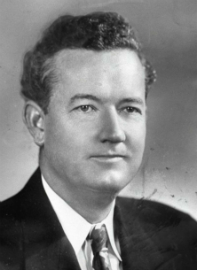
Senator John J. Sparkman of Huntsville ran unsuccessfully for vice president of the United States on the Democratic ticket with presidential candidate Adlai Stevenson of Illinois. They lost to Dwight D. Eisenhower and Senator Richard M. Nixon.
1955

J. Lister Hill became chairman of the Senate Committee on Labor and Public Welfare (today's Committee on Health, Education, Labor, and Pensions), a position he held from 1955 to 1969.
1967

John J. Sparkman became chairman of the Senate Committee on Banking and Currency (today's Committee on Banking, Housing, and Urban Affairs), a position he held from 1967 to 1975.
1969

James B. Allen of Gadsden received the Golden Gavel Award for presiding over the Senate for 100 hours in a single session. On September 18, 1970, Senator Allen received a second Golden Gavel Award for presiding an additional 100 hours.
1975
Senator John J. Sparkman became chairman of the Senate Committee on Foreign Relations, a position he held from 1975 to 1977.
1977
Senator John J. Sparkman became Alabama's longest-serving senator, surpassing J. Lister Hill's record of 30 years, 11 months, and 24 days. Sparkman went on to serve a total of 32 years, 1 month, and 28 days. His record was surpassed by Richard Shelby of Tuscaloosa in March 2019.
1978

Maryon P. Allen of Gadsden became the second woman to represent Alabama in the U.S. Senate. Appointed on June 8, 1978, to fill the vacancy caused by the death of her husband, Senator James B. Allen, she took her seat on June 12, 1978, and served until November 7, 1978.
1980

Senator Donald W. Stewart of Anniston delivered George Washington's 1796 Farewell Address on the floor of U.S. Senate, a tradition dating to 1862.
1986
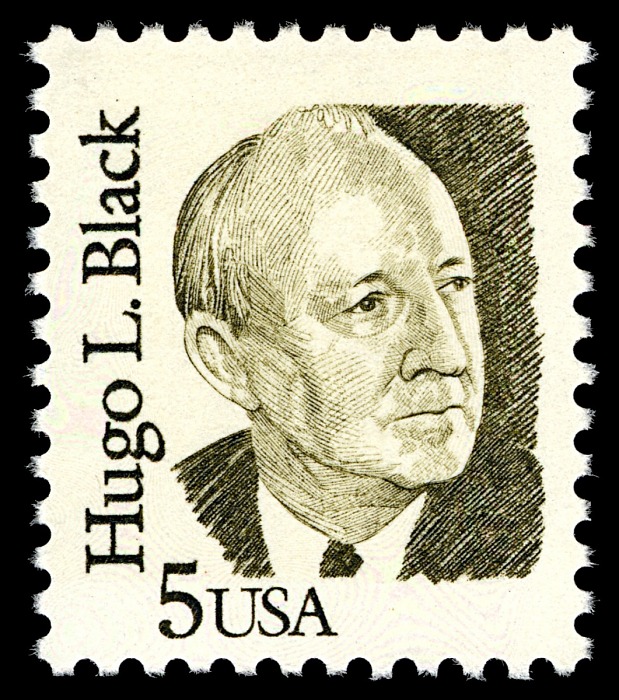
Senator Hugo L. Black was featured on a U.S. postage stamp, one of the "Great Americans" series.
1986

Senator Jeremiah Denton of Mobile received the Golden Gavel Award for presiding over the Senate for 100 hours in a single session.
1988
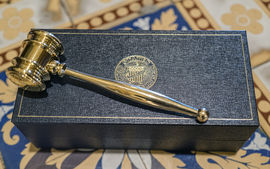
Senator Richard C. Shelby of Tuscaloosa received the Golden Gavel Award for presiding over the Senate for 100 hours in a single session
1994

With the Republican Party winning control of the House and Senate, Alabama senator Richard C. Shelby, a conservative Democrat who previously served in the House, switched to the Republican Party, taking advantage of his seniority in the Senate to gain the chairmanship of the Permanent Select Committee on Intelligence and keep his subcommittee chairmanships.
1997
Richard C. Shelby became chairman of the Senate Select Committee on Intelligence, a position he held from 1997 to January 3, 2001, and again from January 20 to June 6, 2001.
1998

Senator Jefferson B. Sessions III of Mobile received the Golden Gavel Award for presiding over the Senate for 100 hours in a single session. Senator Sessions received a second Golden Gavel Award on October 25, 2000, for presiding an additional 100 hours.
2002
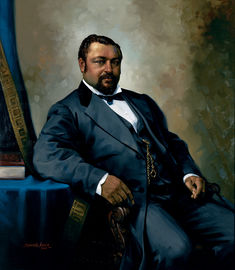
The Senate unveiled Alabama-born artist Simmie Lee Knox's portrait of Mississippi senator Blanche Kelso Bruce. The portrait, completed in 2001, was unveiled in the Old Senate Chamber.
2003
Richard C. Shelby became chairman of the Senate Committee on Banking, Housing and Urban Affairs, a position he held from 2003 to 2007 and again starting in 2015.
2009
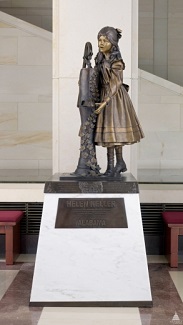
Congress unvieled a statue of Helen Keller, by sculptor Edward Hlavka, in the U.S. Capitol for the National Statuary Hall collection. It replaced a statue of Jabez Lamar Monroe Curry, which Alabama had donated in 1908.
2017
Richard C. Shelby became chairman of the Senate Committee on Rules and Administration, a position he held until April 10, 2018, when he became chairman of the Senate Committee on Appropriations.
2017

Senator Luther Strange of Homewood received the Golden Gavel Award for presiding over the Senate for 100 hours in a Congress.
2018
Richard C. Shelby became chairman of the Senate Committee on Appropriations, a position he held until 2021.
2019

Senator Richard C. Shelby became Alabama's longest-serving senator, surpassing John Sparkman's record of 32 years, 1 months, and 28 days. Shelby retired on January 3, 2023, having served a total of 36 years.